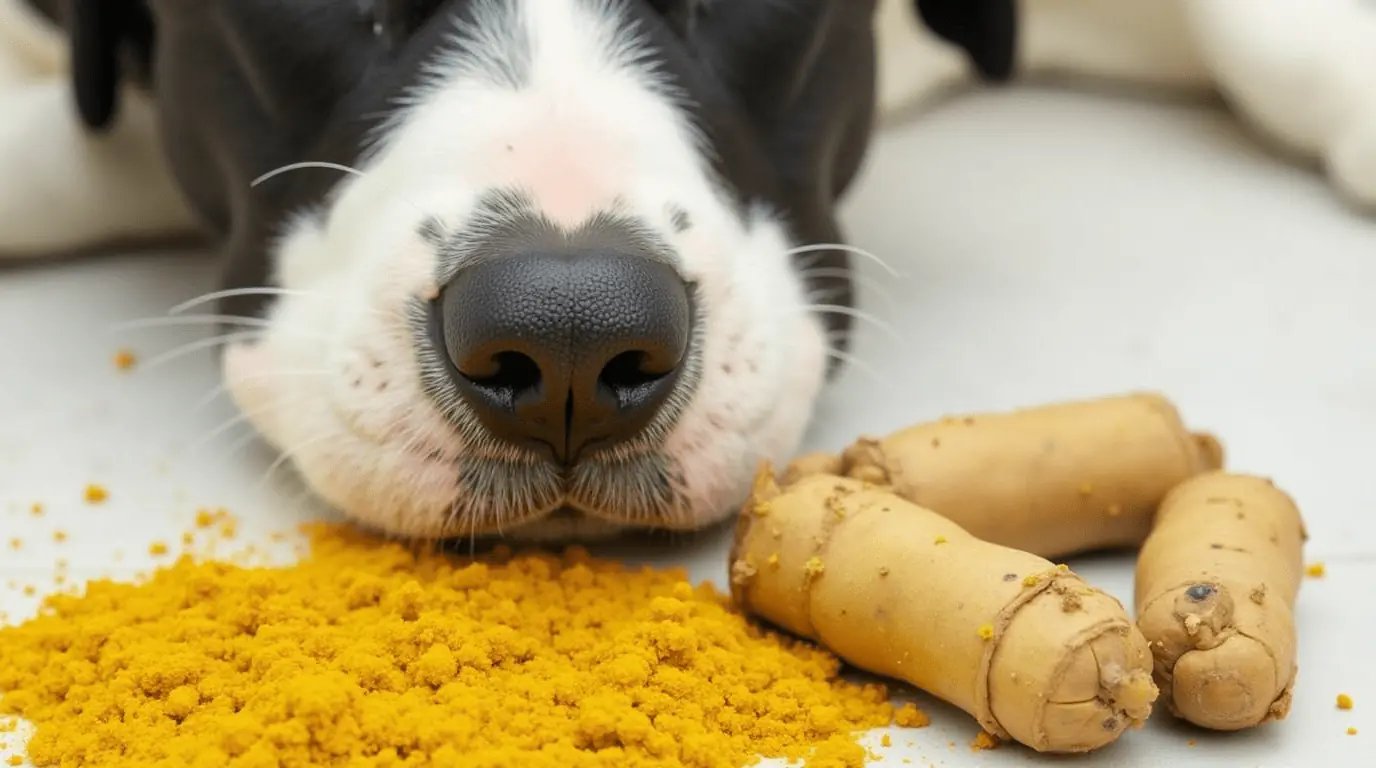Homemade Turmeric for Dogs Recipe Your Pup Will Love
Introduction: Why Turmeric is a Must-Have in Your Dog’s Diet
Turmeric for dogs recipe has become an essential addition to many pet diets due to its numerous health benefits. This golden-yellow root, from the ginger family, is packed with potent compounds that can greatly improve your dog’s overall well-being.
The key ingredient, curcumin, is well-known for its anti-inflammatory and antioxidant properties, making it a game-changer for pets facing joint discomfort, digestive issues, or skin problems. By incorporating a turmeric for dogs recipe into your dog’s diet, you’re offering a natural and powerful way to enhance their health and vitality.
The Healing Powers of Turmeric for Dogs
Turmeric’s versatility as a natural remedy has long been celebrated in traditional medicine, and its benefits for dogs are equally impressive. One of the key reasons why turmeric is revered is its anti-inflammatory and antioxidant properties.
Chronic inflammation can wreak havoc on your dog’s joints, causing pain and limiting mobility. With its ability to reduce inflammation, turmeric can provide relief, especially for senior dogs or those dealing with arthritis. Additionally, turmeric supports the body’s ability to detoxify, enhancing your dog’s overall vitality. It’s not just a treatment; it’s an investment in your dog’s long-term health.
How Turmeric Supports Your Dog’s Overall Well-Being

Turmeric doesn’t just target specific ailments; its holistic benefits support your dog’s health in a comprehensive manner. By incorporating turmeric into your dog’s diet, you are boosting their immune system, promoting healthy digestion, and even improving the appearance of their coat.
The beauty of turmeric lies in its ability to maintain balance within the body—whether it’s through promoting liver health, reducing allergies, or supporting cognitive function in older dogs. As a natural antioxidant, turmeric neutralizes free radicals that cause cellular damage, helping your dog feel younger and more energetic.
The Health Benefits of Turmeric for Dogs

Reducing Inflammation and Easing Joint Pain
One of the most well-known benefits of turmeric for dogs is its ability to reduce inflammation, particularly in the joints. Dogs, especially as they age, can develop arthritis, which causes pain and stiffness.
The anti-inflammatory properties of curcumin, the active ingredient in turmeric, help alleviate these symptoms. When added to your dog’s diet, turmeric can improve mobility, allowing your dog to run, jump, and play without discomfort. It’s a natural way to ease pain, often providing results comparable to pharmaceutical options but without the side effects.
Boosting the Immune System with Natural Antioxidants
Turmeric is packed with antioxidants that bolster your dog’s immune system. These antioxidants combat free radicals, which are unstable molecules that can damage cells and tissues, leading to diseases like cancer. Regular intake of turmeric enhances your dog’s immune response, making it easier for them to fight off infections and illnesses. This, in turn, helps your pup maintain an active and healthy lifestyle. If your dog tends to suffer from allergies, a daily dose of turmeric could also help reduce their sensitivity to environmental triggers.
Supporting Digestive Health: The Role of Turmeric
A healthy gut is fundamental to your dog’s overall well-being, and turmeric can be a vital ally in promoting digestive health. It aids in the production of bile, which is essential for digesting fats and absorbing nutrients.
Turmeric also has anti-inflammatory effects on the digestive tract, helping to soothe conditions like gas, bloating, and irritable bowel syndrome (IBS). Furthermore, its ability to detoxify supports the liver, which plays a crucial role in digestion. If your dog struggles with digestion, turmeric could be a natural remedy worth considering.
How Turmeric Helps Achieve a Shiny, Healthy Coat
In addition to its internal health benefits, turmeric can enhance the appearance of your dog’s coat. The powerful antioxidants in turmeric help fight the oxidative stress that leads to dull, brittle fur.
By incorporating turmeric into your dog’s diet, you may notice that their coat becomes shinier, softer, and more vibrant. Additionally, turmeric can help alleviate skin issues like itching or dryness, giving your dog the smooth, healthy skin they deserve.
Key Ingredients in a Homemade Turmeric for Dogs Recipe

Why Organic Turmeric is Best for Your Dog
When selecting turmeric for your dog, it’s essential to choose organic turmeric. Non-organic versions may contain pesticides and chemicals that could undermine the health benefits of the spice. Organic turmeric is grown without synthetic fertilizers or harmful chemicals, ensuring that your dog gets the purest form of the herb. This is especially important since your dog will be consuming it regularly. Opting for organic turmeric ensures you’re giving your dog a wholesome, natural supplement.
The Role of Coconut Oil in Maximizing Benefits
Coconut oil plays a critical role in making turmeric more bioavailable to your dog. It contains medium-chain triglycerides (MCTs) that help increase the absorption of turmeric’s active compound, curcumin. Coconut oil also provides additional health benefits, including boosting brain health, improving skin and coat conditions, and promoting digestive health. This combination of turmeric and coconut oil creates a potent, synergistic effect that maximizes the healing properties of both ingredients.
How Black Pepper Enhances Turmeric’s Absorption
Another ingredient that enhances the effectiveness of turmeric is black pepper. The piperine found in black pepper increases the absorption of curcumin by up to 2,000%. This means your dog can absorb more of the beneficial compounds from turmeric, making it more effective. A small pinch of freshly ground black pepper in your homemade turmeric recipe can make a world of difference, ensuring that your dog gets the full range of benefits from the turmeric.
How to Safely Introduce Turmeric into Your Dog’s Diet
Understanding the Right Dosage for Dogs
The right dosage of turmeric for your dog depends on their size and health condition. It’s important to start with a small amount and gradually increase it. A general guideline is to offer 1/4 teaspoon per 10 pounds of body weight. However, always consult your veterinarian for personalized recommendations, especially if your dog has any pre-existing health conditions.
Daily Dosage Guidelines: How Much Is Too Much?
While turmeric offers many benefits, too much can lead to unwanted side effects, including digestive upset or even kidney issues. A balanced approach is key. For most dogs, sticking to the recommended daily dosage is sufficient. If your dog has never had turmeric before, introduce it slowly, and monitor for any signs of discomfort. If you notice any adverse reactions, stop giving turmeric and consult your vet.
Precautions to Take When Starting Turmeric
Before introducing turmeric to your dog’s diet, it’s essential to take a few precautions. If your dog is on medication, particularly blood thinners or diabetes medication, turmeric may interfere with the drug’s effectiveness. Additionally, some dogs may have allergies or sensitivities to turmeric. Always start with a small dose, and watch for signs of an allergic reaction such as itching, swelling, or gastrointestinal upset.
Step-by-Step Guide to Making Homemade Turmeric for Dogs
Preparing Your Ingredients: What You’ll Need
To make a homemade turmeric recipe for your dog, you’ll need the following ingredients: organic turmeric powder, coconut oil, black pepper, and water. These ingredients are easy to find at your local grocery store or health food market. Make sure to choose high-quality, organic turmeric to ensure that your dog gets the best possible benefits.
Simple Instructions for Creating a Turmeric Paste
- Mix 1/4 cup of turmeric powder with 1/2 cup of water in a saucepan over medium heat.
- Stir continuously to avoid clumping, and bring the mixture to a gentle boil.
- Add 1/4 cup of coconut oil and a pinch of black pepper to the mixture, stirring until everything is well combined.
- Let the paste cool before serving it to your dog.
Cooling and Storing the Recipe for Freshness
Once the turmeric paste has cooled, transfer it to an airtight container and store it in the refrigerator. The paste can be kept for up to two weeks. For longer storage, consider freezing the paste in small portions and thawing them as needed.
Creative Ways to Serve Turmeric to Your Dog
Adding Turmeric to Your Dog’s Regular Meals
Incorporate turmeric into your dog’s meals by mixing a small spoonful of the paste into their regular food. The slightly bitter flavor pairs well with meat, rice, or even vegetables.
Healthy Turmeric Treats: Your Dog’s New Favorite Snack
Turn turmeric paste into tasty dog treats by freezing it in silicone molds. You can create fun shapes and give your dog a treat that not only tastes good but also contributes to their health.
Mixing Turmeric with Other Healthy Ingredients
Combine turmeric with other dog-friendly superfoods like pumpkin or carrots to create a more flavorful and nutrient-dense snack. Adding turmeric to homemade dog biscuits or chews can also offer your dog additional benefits.
Signs Your Dog Will Benefit from Turmeric
When to Use Turmeric for Joint Pain and Inflammation
If your dog is showing signs of arthritis, limping, or has trouble getting up after resting, turmeric can help reduce inflammation and provide relief from joint pain. Regular use of turmeric can improve their mobility and ease discomfort.
Is Your Dog Struggling with Digestive Issues?
Turmeric is excellent for alleviating digestive problems like constipation, bloating, or gas. If your dog has a sensitive stomach or suffers from irritable bowel syndrome, turmeric can help soothe the gut and promote better digestion.
Skin and Coat Problems That Turmeric Can Help Solve
Dogs with itchy, dry skin, or dull fur can benefit from turmeric’s ability to promote healthy skin and hair. Its anti-inflammatory properties can reduce irritation, while its antioxidants can enhance the quality of its coat.
Potential Risks and Side Effects of Turmeric for Dogs
What You Should Know About Possible Allergies or Sensitivities
Some dogs may experience allergic reactions to turmeric, though this is relatively rare. Symptoms of an allergic reaction may include itching, swelling, or gastrointestinal upset. If these occur, stop giving your dog turmeric immediately and consult your vet.
Can Turmeric Interfere with Other Medications?
If your dog is on medication, particularly blood thinners or diabetes medications, turmeric may interfere with these drugs. Always consult with a veterinarian before adding turmeric to your dog’s diet if they are on any medication.
Signs Your Dog Might Be Overdoing It
If your dog consumes too much turmeric, they may experience side effects such as diarrhea, vomiting, or gastrointestinal discomfort. Monitor your dog’s reaction to turmeric and adjust the dosage accordingly.
How to Store Your Homemade Turmeric for Dogs Recipe
Best Practices for Storing Leftover Turmeric Treats
Store any leftover turmeric paste or treats in an airtight container to maintain their freshness. For optimal storage, keep the treats refrigerated and consume them within two weeks.
How Long Can You Keep Turmeric-Based Treats Fresh?
Turmeric-based treats can be kept fresh for up to two weeks when refrigerated. For longer storage, freeze them in small portions to maintain their quality.
Other Beneficial Homemade Recipes for Your Dog Using Turmeric
Turmeric and Pumpkin: A Tasty, Digestive Boost
Combining turmeric with pumpkin creates a powerful digestive aid. Pumpkin is rich in fiber, which supports digestive health, while turmeric enhances its anti-inflammatory effects.
Turmeric and Bone Broth: A Comforting Health Booster
Bone broth is packed with nutrients, and when combined with turmeric, it creates a warming, health-boosting treat for your dog. This combination helps support joint health and promotes overall wellness.
When to Consult Your Vet About Using Turmeric for Your Dog
Knowing When Turmeric Isn’t Enough
While turmeric is beneficial, it may not be a cure-all. If your dog’s symptoms persist or worsen, it’s time to consult your veterinarian for a more comprehensive treatment plan.
Why a Vet’s Opinion is Crucial for New Supplements
Before adding any new supplement to your dog’s diet, including turmeric, consult with your vet. They can provide guidance on dosage and ensure that the supplement won’t interfere with your dog’s current health conditions or medications.
Conclusion: The Long-Term Benefits of Regularly Using Turmeric for Your Dog
How Consistent Use Can Enhance Your Dog’s Health
Long-term use of turmeric can lead to noticeable improvements in your dog’s health. By reducing inflammation, boosting immunity, and promoting better digestion, turmeric ensures that your dog maintains optimal health as they age.
Why Turmeric Is Worth the Investment for Your Pup’s Wellness
Investing in turmeric for your dog is investing in their overall wellness. This natural remedy not only offers immediate benefits but also helps protect against long-term health issues. With consistent use, your dog will enjoy a happier, healthier life.
FAQs
How do I prepare turmeric for my dog?
To prepare turmeric for your dog, start by creating a simple Turmeric for Dogs Recipe. Mix organic turmeric powder with coconut oil to form a paste, then add a dash of black pepper to improve absorption. Incorporate this mixture into your dog’s food, adjusting based on their size and dietary needs.
How do you make turmeric paste for dog wounds?
To make turmeric paste for dog wounds, combine Turmeric for Dogs Recipe ingredients such as organic turmeric powder, coconut oil, and a pinch of black pepper. Mix into a thick paste and apply gently to the wound. The paste will help reduce inflammation and promote healing with its natural anti-inflammatory properties.
Can I put turmeric in my dog’s water?
Yes, you can add turmeric to your dog’s water, but it’s important to do so in moderation. A pinch of turmeric, as part of a Turmeric for Dogs Recipe, can be a natural way to support your dog’s health. Ensure it is well-mixed and observe for any adverse reactions.
How much black pepper with turmeric for dogs?
When adding black pepper to turmeric for dogs, a small pinch is sufficient. Black pepper enhances the absorption of turmeric, making it more effective. For a balanced Turmeric for Dogs Recipe, start with a dash of pepper per serving. Monitor your dog’s response to ensure it’s well tolerated.
how to apply turmeric for dogs skin
To apply turmeric for your dog’s skin, create a paste by mixing Turmeric for Dogs Recipe with coconut oil. Gently massage the mixture onto the affected area. Let it sit for 10-15 minutes before wiping it off. This natural remedy can help soothe irritation and promote healing for your dog’s skin.






